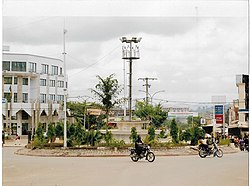Agriculture
Agriculture is the primary industry of Ebolowa, with about 80% of the population working in the industry. [2] The city has a fruit tree nursey which grows and transports 2,500 seeds annually. [2]
Ebolowa's main crop is cocoa bean, [3] and in 2024, a planned Puratos cocoa factory in the city was announced, alongside one in Obala. [4] Another processing plant—composed of three buildings—was agreed upon between mayor André Thomas Bengon and Takaoka Nozomu [ ja ], the Japanese ambassador to Cameroon. The agreement was sponsored by minister of commerce Luc Magloire Atangana Mbarga. [5]
On 13 November 2024, operation of a tractor manufacturing plant in Ebolowa was granted to Cameroon's National Center for Studies and Experimentation of Agricultural Machinery (Ceneema), a company that studies and adapts agricultural machinery. The deal was agreed upon by Ceneema executive Andrée Caroline Mélanie Ekotto Minkouna, and minister of finance Alamine Ousmane Mey, as well as receiving support from the Exim Bank of India. [6]



